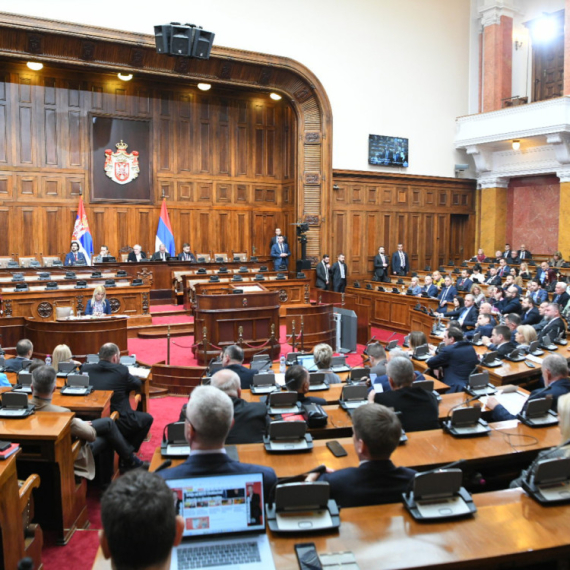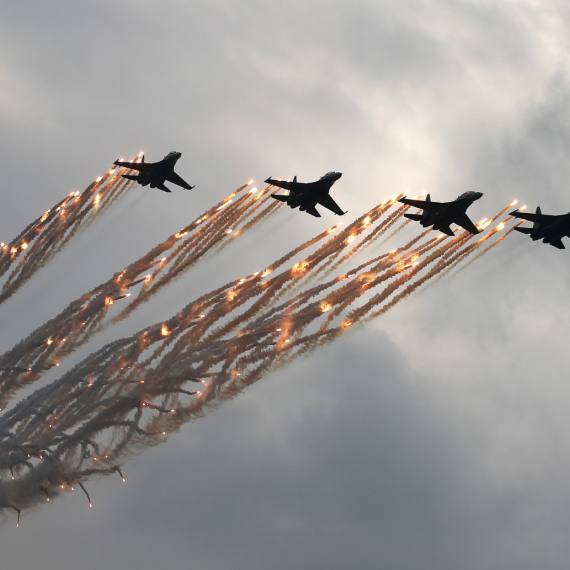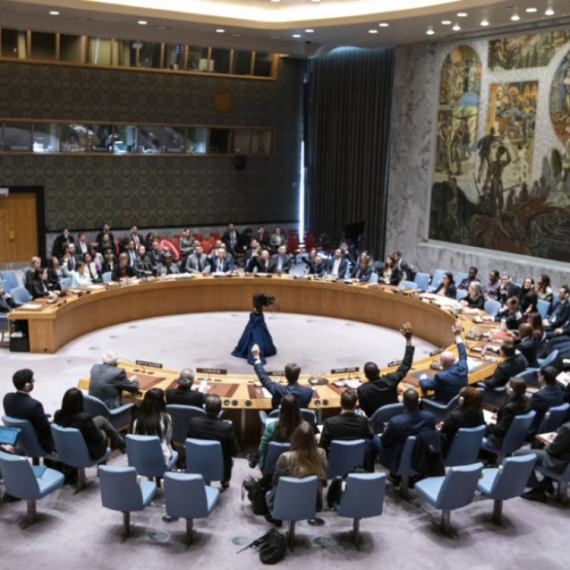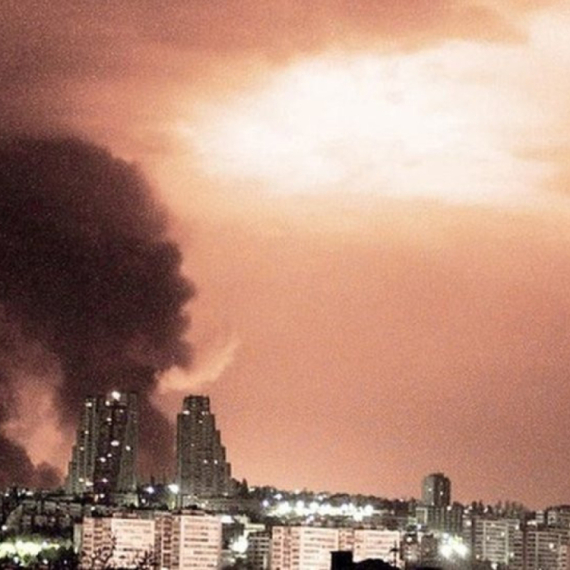U.S. Senate approves USD 70bn dollars in war funds
The U.S. House of Representatives was expected to vote Wednesday on a Senate-approved budget bill for 2008.
Wednesday, 19.12.2007.
15:16

The U.S. House of Representatives was expected to vote Wednesday on a Senate-approved budget bill for 2008. The bill includes USD 70bn for the wars in Iraq and Afghanistan. U.S. Senate approves USD 70bn dollars in war funds In a boost to President George W. Bush, the Senate voted late Tuesday to approve the catch-all USD 555bn budget bill, adding extra war funds without any of the restrictions that Democrats hoped to pin on their release, such as linking them to a withdrawal date for U.S. troops. The House of Representatives' version passed Monday had included USD 31bn solely for U.S.-led efforts in Afghanistan but none for Iraq. House lawmakers are now only to vote on the war funding portion added by the Senate, which was approved by a vote of 70-25. If it passes the House, Bush has indicated he will sign the spending package. Amid deep differences with the Congress over the Iraq war, the White House had threatened to veto the entire spending bill if it contained no funding for Iraq. "Obviously, the full funding that we requested since February is what the troops need -- not just what they want, but what they need. But this will help us get through this period," said Bush spokeswoman Dana Perino. Democrats, who took over the U.S. Congress in November 2006 elections fueled by anger at the war in Iraq, have tried without success to use their power of the purse to impose a timetable for withdrawal from the strife-torn country where nearly 4,000 U.S. troops have died since the March 2003 invasion. Democrats reportedly also gave up several billion dollars' worth of other budget demands rejected by Bush, in order to see the spending measure passed before the year-end recess. They have also been concerned about being seen as unsupportive of U.S. troops in battle at Christmas. Democratic House majority leader Steny Hoyer told CNN that the House initially passed the 31 billion dollars in funding for Afghanistan "so that we could confront terrorism and defeat the Taliban which was, after all, the site from which this country was attacked and which, frankly, we have distracted our attention from." The package, known as the Consolidated Appropriations Act, 2008, includes 11 of 12 annual appropriations bills, leaving out defense which has already been approved by lawmakers. Among other things, the bill funds veterans' health care, emergency spending on border security, firefighting to tackle massive wildfires on the West Coast, bridge repair and even funds for peacekeeping in Darfur. Republican Senator Mitch McConnell, who introduced the amendment to add funding for the Iraq war, said the House version "underfunds" troops in Iraq. He hailed the advances made by General David Petraeus' plan to "surge" the number of U.S. troops. "Since the implementation of the Petraeus Plan, we've marveled at the improving security situation in and around Baghdad. Attacks on U.S. troops are down. Civilian casualties in Baghdad are down 75 percent. "There is simply no question that on the military and tactical levels, the Petraeus Plan has been a tremendous success. "Even those of us who have disagreed on this war have always agreed on one thing: troops in the field will not be left without the resources they need." However, Democratic Senator Edward Kennedy voiced his opposition to the Republican plan. "It's wrong for Congress to write still another blank check to the President for the war. It's obvious that President Bush wants to drag this process out month after month, so he can hand off his Iraqi policy to the next president."
U.S. Senate approves USD 70bn dollars in war funds
In a boost to President George W. Bush, the Senate voted late Tuesday to approve the catch-all USD 555bn budget bill, adding extra war funds without any of the restrictions that Democrats hoped to pin on their release, such as linking them to a withdrawal date for U.S. troops.The House of Representatives' version passed Monday had included USD 31bn solely for U.S.-led efforts in Afghanistan but none for Iraq.
House lawmakers are now only to vote on the war funding portion added by the Senate, which was approved by a vote of 70-25. If it passes the House, Bush has indicated he will sign the spending package.
Amid deep differences with the Congress over the Iraq war, the White House had threatened to veto the entire spending bill if it contained no funding for Iraq.
"Obviously, the full funding that we requested since February is what the troops need -- not just what they want, but what they need. But this will help us get through this period," said Bush spokeswoman Dana Perino.
Democrats, who took over the U.S. Congress in November 2006 elections fueled by anger at the war in Iraq, have tried without success to use their power of the purse to impose a timetable for withdrawal from the strife-torn country where nearly 4,000 U.S. troops have died since the March 2003 invasion.
Democrats reportedly also gave up several billion dollars' worth of other budget demands rejected by Bush, in order to see the spending measure passed before the year-end recess. They have also been concerned about being seen as unsupportive of U.S. troops in battle at Christmas.
Democratic House majority leader Steny Hoyer told CNN that the House initially passed the 31 billion dollars in funding for Afghanistan "so that we could confront terrorism and defeat the Taliban which was, after all, the site from which this country was attacked and which, frankly, we have distracted our attention from."
The package, known as the Consolidated Appropriations Act, 2008, includes 11 of 12 annual appropriations bills, leaving out defense which has already been approved by lawmakers.
Among other things, the bill funds veterans' health care, emergency spending on border security, firefighting to tackle massive wildfires on the West Coast, bridge repair and even funds for peacekeeping in Darfur.
Republican Senator Mitch McConnell, who introduced the amendment to add funding for the Iraq war, said the House version "underfunds" troops in Iraq. He hailed the advances made by General David Petraeus' plan to "surge" the number of U.S. troops.
"Since the implementation of the Petraeus Plan, we've marveled at the improving security situation in and around Baghdad. Attacks on U.S. troops are down. Civilian casualties in Baghdad are down 75 percent.
"There is simply no question that on the military and tactical levels, the Petraeus Plan has been a tremendous success.
"Even those of us who have disagreed on this war have always agreed on one thing: troops in the field will not be left without the resources they need."
However, Democratic Senator Edward Kennedy voiced his opposition to the Republican plan.
"It's wrong for Congress to write still another blank check to the President for the war. It's obvious that President Bush wants to drag this process out month after month, so he can hand off his Iraqi policy to the next president."



























































Komentari 0